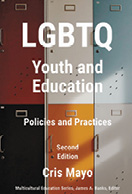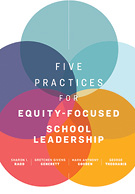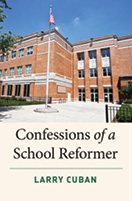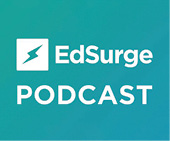Syllabus: May 2022
LGBTQ Youth and Education: Policies and Practices

The second edition of LGBTQ Youth and Education: Policies and Practices (Teachers College Press) is a powerful tool for educators committed to developing the pedagogy, curriculum, and policies to improve school experiences for LGBTQ students and their allies. Author Cris Mayo, an education professor at the University of Vermont, begins his book by explaining what is at stake in terms of LGBTQ students’ physical and mental health, safety, and academic outcomes. He examines how schools have long been sites for controversies over sexuality, a trend which continues today with the onslaught of anti-LGBTQ bills. Mayo also sheds light on the damaging effects of specific school-based policies, including zero-tolerance policies that have led to blanket punishment of LGBTQ students who have stood up for themselves in the wake of relentless harassment. He also documents how extracurricular clubs and programs, such as Gay-Straight Alliances (GSAs), have made school safer for all students.
Five Practices for Equity-Focused School Leadership

Five Practices for Equity-Focused School Leadership (ASCD) serves as a guide for school leaders seeking to implement the practices and policies necessary to diminish marginalization based on identity (race, language, gender, etc.) to create equitable school environments for all children. The text is written by four scholars who collaboratively process what it means to be an equity-focused leader in the light of pervasive educational inequality, a global pandemic, the 2020 presidential election, and the national reckoning on racism that followed the murder of George Floyd. Authors Sharon I. Radd, associate professor of organizational leadership at St. Catherine University; Gretchen Givens Generett, interim dean of the School of Education at Duquesne University; Mark Anthony Gooden, professor in education leadership at Teachers College, Columbia University; and George Theoharis, professor in educational leadership and inclusive elementary/early childhood education at Syracuse University, pull from their own academic research and their own diverse identities and experiences serving as school leaders and training new ones. They provide a thoughtful and accessible framework for “disruptive practices” to challenge the status quo and attain full access for all students. The book also helpfully includes a series of writing prompts for readers to reflect on previous practices and beliefs, audits and activities to assess and analyze current practices, strategies for eConfessions of a School Reformerngaging members of the school community and other stakeholders, and templates and suggestions for planning forward.
Confessions of a School Reformer

For the past six decades, Larry Cuban has been working to improve educational institutions in America—first as a teacher, then as a superintendent, and finally as a professor at the Stanford Graduate School of Education. In Confessions of a School Reformer (Harvard Education Press), he reflects on all that he has learned and considers how his ideas and beliefs have changed and grown over time. The book is divided into three sections based on what Cuban has identified as the dominant eras in education reform: the Progressive Era (1890–1940s), when reformers sought to remake schools as efficient places to prepare students for civic life and the workplace during industrialization, urbanization, and an influx in population; the Civil Rights Era (1950s–1970s) when civil rights legislation including Brown v. Board of Education was passed and schools were legally required to desegregate; and the Standards-Based Reform Movement (1970s–present) when there was a backlash to the prior era and society began trying to hold schools accountable for economic growth. Throughout the book, which is part memoir and part academic text, Cuban analyzes how each era shaped public schooling, and he provides insight into many of the challenges schools face today.
“EdSurge” Podcast

A weekly podcast covering a wide range of issues in preK–higher education, “EdSurge” is hosted by managing editor Jeffrey R. Young, a former editor and writer for The Chronicle of Higher Education. In each episode, Young engages education experts in frank conversations on unique topics—such as whether NFTs (non-fungible tokens) should play a role in education and what learning science says about improving teaching—and asks them to make informed predictions about the future of education. The experts include developmental psychologists, veteran educators, historians, and education tech creatives. Most episodes fall into one, or a combination of, the following three categories; 1) new technologies and how they shape education, such as the episode titled, “Educators Have Some Pointed Advice for Tech Companies Building the Metaverse,” 2) improving systems and practices related to diversity, equity, and inclusion, like the episode titled, “Recruiting Black Men to Lead in the Classroom,” and 3) revisiting the history of longtime educational practices and beliefs, such as the three-part series of episodes about talented and gifted programs titled, “The Surprising History of a Very American Idea.” Unsurprisingly, many episodes explore virtual learning and COVID-19-related challenges, yet each looks ahead and considers how the past two years may shape the next era of school reform. “EdSurge” is a go-to resource for school leaders looking for nuanced analysis of what the future of schools and schooling may hold.
